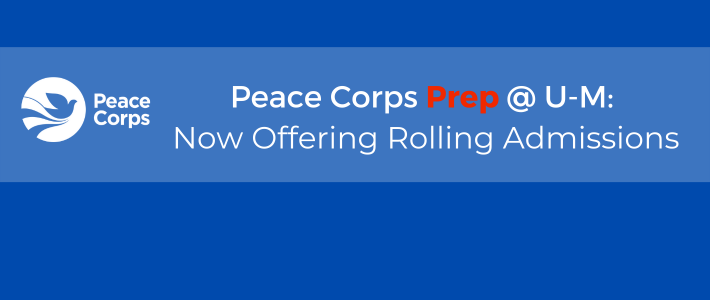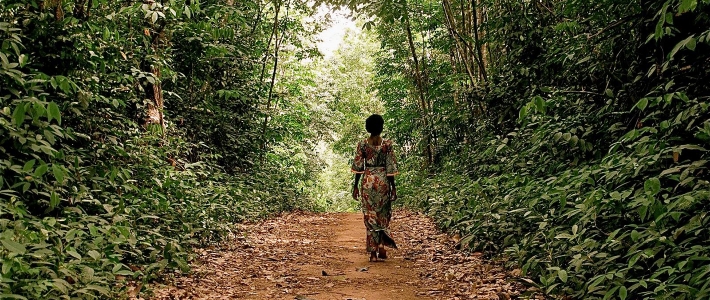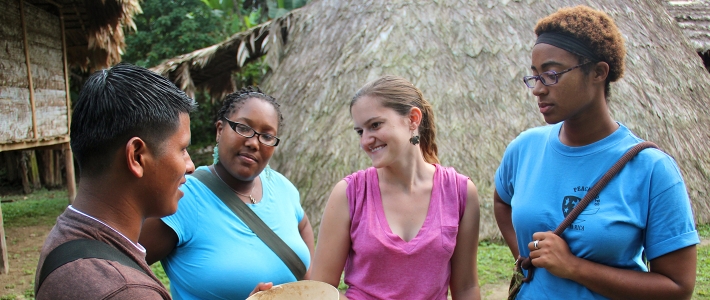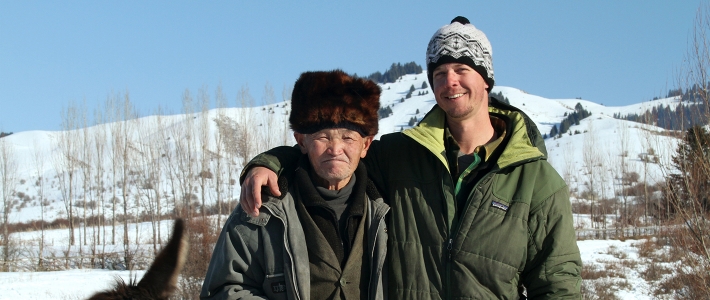The Peace Corps Prep program is designed to prepare undergraduate students for international service in a program such as the Peace Corps. In order to successfully prepare for such work, students are required to fulfill requirements of four different competencies: work sector, language, intercultural competence, and leadership. See below for an overview of the requirements, or consult the student guide for more detailed information.
1. Work Sector Experience: This competency involves both coursework and fieldwork experience, related to one of the six following Peace Corps work sectors: Education, Health, Environment, Agriculture, Youth in Development, or Community Economic Development.
As the work sectors vary greatly, there are different requirements for each. See below for more information on how to fulfill the requirements of your chosen work sector. In order to indicate to Peace Corps Prep that you've completed your work sector hours, please have your volunteer or internship supervisor complete the Work Sector Experience Verification Form. The completed form should be uploaded to M-Compass.
Education
- Consider the Education for Empowerment minor or choose three courses from ONE of the following areas to build expertise in that area:
- Elementary, Secondary or Special Education: Any EDUC courses
- English: Any ENGLISH courses
- Linguistics: Any LING courses
- Math: Any MATH courses
- Computer Science: Any EECS courses
- Astronomy: Any ASTRO courses
- Biology: Any BIOLOGY courses
- Biophysics: Any BIOPHYS courses
- Chemistry: Any CHEM courses
- Geography: Any GEOG courses
- Molecular, Cellular and Developmental Biology: Any MCDB courses
- Microbiology: Any MICRBIOL courses
- Physics: Any PHYSICS courses
- ELI 390: Community-Engaged Learning in ESL Teaching Contexts
- ELI 391: Topics in ESL: Fundamentals in Teaching English as a Second Language Internationally
- Build a minimum of 50 hours of related field experience through an activity such as teaching in a classroom, with a community outreach organization, or in a formal tutoring capacity. The subject of the teaching may be English as a Foreign/Second Language, special education, drama, or a STEM subject. You may consider the following opportunities:
- There are several volunteer opportunities available through the Ginsberg Center on campus. In collaboration with schools, community centers and other partners, you are able to support literacy development through America Reads, a program that provides paid opportunities for U-M students to tutor students in Detroit and Ypsilanti through the work-study program.
- rEDesign is a group of University of Michigan students who design and implement innovative projects, programs, and events to better the public education system.
- Volunteer to be a facilitator with Conversation Circles, which are weekly, one-hour meetings run through the English Language Institute (ELI).
- EDUC 390: Community Engaged Learning in ESL Teaching Contexts: This course is an opportunity to receive training and supervision in teaching English as a Second Language and then assist in a local ESL classroom or tutoring program for at least four hours per week or 48 hours during the academic term.
Health
- Choose three courses relating to the Peace Corps health sector from any of the following areas:
- Nursing: Any NURS courses
- Anatomy and Cell Biology: Any ANAT courses
- Biology: Any BIOLOGY courses
- Environmental Sciences and Engineering: Any ENSCEN courses
- Health and Fitness: Any HF courses
- Health Sciences: Any HS courses
- Molecular, Cellular and Developmental Biology: Any MCDB courses
- Movement Science: Any MOVESCI courses
- Physiology: Any PHYSIOL courses
- Public Health: Any PUBHLTH courses
- Psychology: Any PSYCH courses
- Build a minimum of 50 hours of related field experience through an activity such as: volunteer or work experience in such areas as HIV/AIDS outreach, hospice, family planning counseling, emergency medical technician (EMT) or CPR teaching/certification, maternal health, and hands-on caregiving in a hospital, clinic, or lab technician setting; counseling or teaching in health subjects; working as a resident advisor in a dormitory, as a peer nutritionist, or as a sexually transmitted infections counselor; significant experience in mechanical repairs, construction, carpentry, masonry, plumbing, hydrology, or set design. You may wish to consider the following opportunities:
- Michigan Health Engineered for All Lives (M-HEAL), a student organization that fosters interdisciplinary work in global health, design and entrepreneurship through interactive workshops and volunteer opportunities to support teams as they develop health care solutions to work with international partners abroad.
- The U-M Minority Health and Health Disparities International Research Training Program (M-HIRT), is an all-expenses paid program that provides students the opportunity to engage in important and interesting research overseas on issues related to health disparities.
- The Design for Global Health Academic Program addresses global health challenges through clinical immersion worldwide and design coursework on campus. Students in this program have performed design ethnography in hospitals in Ghana, Ethiopia, Nicaragua and China.
- Volunteer with University Health Services or with Michigan Medicine.
- Volunteer through the U-M Spectrum Center.
- Volunteer through the Sexual Assault Prevention and Awareness Center (SAPAC) on campus through the Bystander Intervention and Community Engagement Program or Peer Educator Program.
- American Medical Student Association provides volunteer opportunities to expose members to the medical field.
- There are opportunities through several non-profits in the area including:
Environment
- Consider a Sustainability minor, Environment minor, or the Water and the Environment Minor or, choose three courses relating to the Peace Corps environment sector from any of the following areas:
- Climate and Space Science: Any CLIMATE courses
- Biology: Any BIOLOGY courses
- Earth and Environmental Sciences: Any EARTH courses
- Ecology and Evolutionary Biology: Any EEB courses
- Environment: Any ENVIRON courses
- Environment and Sustainability: Any EAS courses (Note: these are graduate level courses)
- Build a minimum of 50 hours of related field experience through an activity such as educating the public on environmental/conservation issues, or working on environmental campaigns; conducting biological surveys of plants or animals; gardening, farming, nursery management, or landscaping; or providing technical assistance and training in natural resource management. You may consider the following opportunities:
- The U-M Student Sustainability Initiative coordinates a wide range of sustainability-related student groups on campus.
- Planet Blue has a long list of ways to get involved with environmental initiatives on campus.
- Sustainability without Borders is a student-group sponsored by the Center for Sustainable Systems at the U-M’s School of Natural Resources focused on building a network of sustainability practitioners who develop and implement environmentally, socially and economically sustainable projects.
- There are opportunities through several local non-profit organizations including:
Agriculture
- Consider a Food minor, or choose three courses relating to the Peace Corps agriculture sector from any of the following areas:
- Biology: Any BIOLOGY courses
- Business Administration: Any BA courses
- Business Economics and Public Policy: Any BE courses
- Economics: Any ECON courses
- Build a minimum of 50 hours of related field experience through an activity such as working in gardening, farming, nursery work, tree planting, urban forestry, landscaping, livestock care, or fish cultivation and production; teaching or tutoring the public in environmental or agricultural issues/activities; or working on the business management or marketing side of a commercial farm. You may consider the following opportunities:
- The U-M Sustainable Food Program (UMSFP) fosters collaborative leadership that empowers students to create a sustainable food system at U-M. The UMSFP has a student-led leadership team, advisory board, member groups, and The Campus Farm at University of Michigan Matthaei Botanical Gardens and Nichols Arboretum
- The STAMPS School of Art and Design offers a course: Design Build Studio: Shelter (Detroit) that partners with Neighbors Building Brightmoor (NBB) to give you the opportunity to design and build structures that support and expand your local food system. Check current course-listings for availability.
- There are a number of opportunities through local non-profit organizations including:
Youth in Development
- Obtain the Community Action and Social Change (CASC) minor, or choose three courses relating to the Peace Corps youth in development sector from any of the following areas:
- Cognitive Science: Any COGSCI courses
- Psychology: Any PSYCH courses
- Organizational Studies: Any ORGSTUDY courses
- Social Work: Any SW courses
- Sociology: Any SOCIOLOGY courses
- Build a minimum of 50 hours of related field experience through an activity such as teaching or counseling in at-risk youth programs or engaging in activities that involve planning, organizing, assessing community needs, counseling, and leadership, in areas such as education, youth development, health and HIV/AIDS, the environment, and/or business. You may consider the following opportunities:
- Through PSYCH 211 Project Outreach, work directly in communities to address community needs.
- Students studying Spanish can enroll in RCLANG 304-PALMA Spanish in the Community in order to work as tutors for youth in the Latinx community enriching their process of language acquisition and cultural exchange.
- RCHUMS 334 or RCHUMS 341: Empowering Community through the Arts, students conduct art workshops in prisons, juvenile facilities and community settings.
- There are several volunteer opportunities with local non-profit organizations including:
Community Economic Development
- You may want to consider the International Studies major with a focus on Political Economy and Development (PED) or the International Studies minor with a thematic focus on International Economics & Development. Or, choose three courses relating to the Peace Corps community economic development sector from any of the following areas:
- Accounting: Any ACC courses
- Art and Design: Any ARTDES courses
- Business Administration: Any BA courses
- Business Communication: Any BCOM courses
- Business Economics and Public Policy: Any BE courses
- Business Law: Any BL courses
- Business Abroad: Any BUSABRD courses
- Computer Science: Any EECS courses
- Communication Studies: Any COMM courses
- Economics: Any ECON courses
- Entrepreneurial Studies: Any ES courses
- Finance: Any FIN courses
- Management and Organizations: Any MO courses
- Organizational Studies: Any ORGSTUDY courses
- Information: Any SI courses
- Technical Communication: Any TCHNCLCM 215 courses
- Technology and Operations: Any TO courses
- Build a minimum of 50 hours of related field experience through an activity such as working with businesses or organizations in accounting, finance, management, budgeting or marketing; starting and running your own entrepreneurial activity; training others in computer literacy; website design; or working in publishing. You may consider the following opportunities:
- Global Initiatives at U-M’s Ross School of Business offers global business-related opportunities such as international internships and semester exchange programs for undergraduate students.
- Semester in Detroit, which provides an opportunity to engage with community members in the city of Detroit through a number of courses and internship opportunities.
- Psych 325/AC306: Community Research: Community Research, an internship opportunity with a community based organization in Detroit. Through this course, students learn research methodologies useful in understanding communities.
- SOC 489-Organizing: People, Power and Change is a course focused on understanding the roots of social problems and how to become effective in addressing them. This course includes an opportunity to intern for 10 hours a week with a local non-profit organization engaged in social change work through organizing.
- ARTDES 314.1 Change By Design is a course through the Stamps School of Art and Design that works with the Detroit Community Schools to co-create social impact through design and entrepreneurship.
- U-M’s Ross School of Business hosts over 70 student organizations.
- There are a number of volunteer opportunities through local non-profit organizations including:
2. Foreign language skills: This competency requires the completion of at least two language courses. The following considerations must be made in fulfilling this competency:
- For those who wish to serve in Latin America: In order to be a competitive applicant for Spanish-speaking countries, take at least two 200-level courses in Spanish
- For those who wish to serve in French-speaking West Africa: Take at least one 200-level course in French
- For those not planning to serve in a Spanish or French speaking country: Any two foreign language courses may be used to fulfill this requirement!
3. Intercultural competence: For this competency, students must take three courses related to intercultural competence.
Core (1 Course)
At least one course must be from the Core Course List. The Core Courses involve critical reflection on engaging with cultural differences. The idea behind the Core Course is to prepare you with a framework for processing life as an intercultural volunteer.
Elective (2 Courses)
Choose two additional courses to fulfill the International Competence elective requirement. There are numerous courses in many departments that will fulfill this requirement, and at this time, we do not maintain a comprehensive, up-to-date list.
Here are some guidelines to get you started with your course search:
- The courses can be from any department so long as they have a focus on comparative perspectives, diversity and inclusion, and/or the study of marginalized groups. At least one should have an international focus.
- The courses should be at least 3-credits each
- Search the LSA Course Guide using keywords to find courses of interest to you.
- For example, if you were interested in deepening your knowledge of African Studies, you could search using “Africa” as a keyword.
- Examples of relevant courses can also be found on the following lists:
- Examples of Elective Intercultural Courses - Peace Corps Prep (Note: this list is no longer being updated and is therefore not exhaustive)
- All courses are pre-approved
- Peace Corps Prep Core Courses
- All courses are pre-approved
- Community Action and Social Change (CASC) Course Lists
- International Minor, College of Engineering - Comparative Perspectives courses
- International Studies Course Lists - Comparative Culture & Identity Track courses
- Examples of Elective Intercultural Courses - Peace Corps Prep (Note: this list is no longer being updated and is therefore not exhaustive)
I’ve found a course of interest - how do I know if it’s approved?
- Schedule an appointment to meet with a Peace Corps Prep advisor to discuss your course options, or email [email protected].
The Minor in Intergroup Relations Education, with a globally-focused LSA elective course, will also fulfill the Intercultural Competence Requirement.
4. Leadership: For this requirement, students must complete the following:
- Have your resume critiqued by someone at the University Career Center or a Peace Corps Recruiter. Students may also work within the career centers in the individual schools and colleges across campus.
- You will need to have documentation signed by an advisor once your resume has been reviewed.
- Attend a workshop or class on interview skills at the University Career Center. The University Career Center has a number of online resources available through their website.
- You will need to have documentation signed by an advisor once you have completed an interview prep appointment or workshop.
- Develop at least one significant leadership experience and be prepared to discuss it thoughtfully. For example, organizing a campus event, leading a work or volunteer project, serving on an advisory board or committee within a specific school or college, or serving on the executive board of a student organization would fulfill this requirement. Some opportunities include:
- Get involved with a student organization which can be found on Maize pages.
- Participate in Leadershape.
- Attend the Intercultural Leadership Seminar (ILS) to learn how to be more effective in a global environment.
- Check out the M-Lead website, which aims to centralize information about leadership opportunities and programs offered to students at U-M.
5. Learn about the Peace Corps Experience: One of the goals of the Peace Corps Prep certificate program is to familiarize students with the Peace Corps and the experience of being a Peace Corps Volunteer. To that end, all Peace Corps Prep students at U-M will need to:
- Attend (at least) ONE U-M Peace Corps event (i.e. coffee chat, RPCV panel, etc.) or
- Have ONE informational interview with a Returned Peace Corps Volunteer.
Once you complete this requirement, you'll need to complete a brief form, which will ask you to document which event you attended as well as a brief reflection. You’ll then upload that form to M-Compass.






